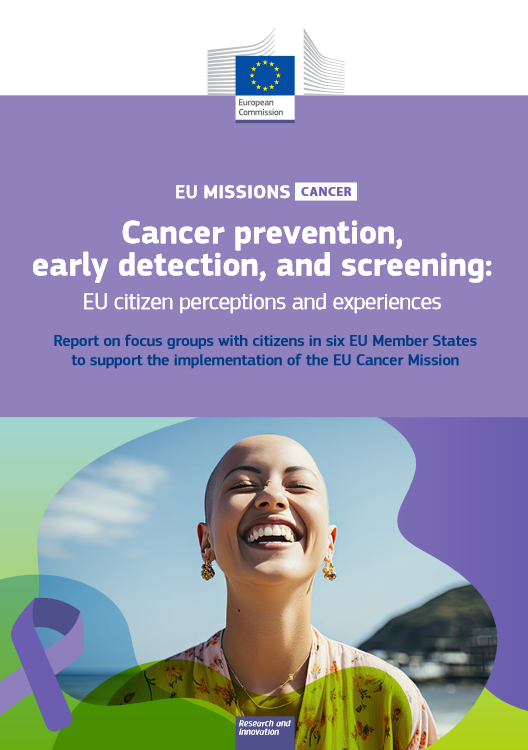Report: Cancer prevention early detection and screening - Citizen perceptions and experiences
Report on focus groups with citizens in six EU Member States to support the implementation of the EU Cancer Mission
Executive summary
Background
The EU Cancer Mission has set the goal to improve the lives of more than 3 million people by 2030 through prevention, cure and for those affected by cancer including their families, to live longer and better. To learn about what citizens find important, a series of focus
groups were organised with citizens in six EU Member States: Bulgaria, Czechia, Finland, France, Lithuania, and Malta. The focus groups concerned discussions about cancer awareness, prevention, early detection, and screening.
Perceptions regarding cancer
The focus groups indicated that cancer was perceived as a frightening disease that could happen to anyone. The fear of a cancer diagnosis and the taboo associated with some cancers could prohibit people to visiting or contacting a doctor. The group was suggested to explain that cancer is not a death sentence and to inform people on what could help prevent cancer.
Perceptions regarding the prevention of cancer
Participants indicated that healthcare professionals are a key source of information. They also emphasised the importance of education about cancer risks and prevention as part of the school curriculum and addressed the importance of accessible and reliable information. Campaigns should express hope and focus on what to do to prevent cancer. Several cancer risk factors were discussed, including sun exposure, tobacco, alcohol, environmental factors, diet, physical activity, and stress. Participants referred to a lack of awareness on how these factors can cause cancer and on how to change their behaviour to avoid exposure to risks and promote a healthier lifestyle. Several participants also discussed the risk of developing cancer due to a hereditary predisposition, despite a healthy lifestyle.
Perceptions regarding early detection and screening
Participants were largely aware of the importance of checking and monitoring one’s body to detect any changes. Most participants were also aware of screening programmes to
detect cancer at an early stage. Reasons for not participating in screening programs, included shame in discussing irregularities and the fear of being diagnosed with cancer. Another barrier was the distance to screening centres for people in remote areas. It was suggested to offer mobile screening facilities, and/or to include cancer screening via general and occupational health practitioners. Participants also mentioned that better information on screening programs is needed to increase participation rates. Information should enhance the understanding of screening and what a screening test entails. Health professionals have an important role to play to better informing citizens on screening programs and to promote open discussions to reduce shame and fear. Still, governments
were considered to be the main source of information, for instance via (social media) campaigns.
Main recommendations
The insights from this study, although based on focus groups with a limited number of EU citizens, underline the importance of improving information and communication on cancer prevention and early detection and screening for EU citizens. More and better actions are needed to address barriers and support citizens in preventing cancer, with actions and initiatives that consider different levels of motivation and beliefs of the population and the wide array of aspects that could hinder preventive and early detection measures.

Corporate author(s): European Commission
Collection: Training content
Subjects: Cancer
Themes: Cluster 1 Health, Pillar 2, Cancer, Missions in HE
You may also be interested in
Date: 29/08/2024 Collections: Events documents
Published by: EU Missions in HE
The document highlights the essential role of social engagement in the Cancer Mission, emphasizing collaborative efforts among citizens, stakeholders, and governments to achieve better cancer outcomes. Social engagement fosters co-creation and inclusion, ensuring effective prevention, early detectio...
Date: 12/11/2024 Collections: Training content
Published by: EU Missions in HE
Date: 23/05/2024 Collections: Training content
Published by: NCPs in Partner Countries
Date: 10/02/2025 Collections: Training content
Published by: EU Missions in HE
The document serves as a basis for analysing some of the challenges concerning specific mission contexts. This first version of the document takes on the shape of a matrix reporting the open and forthcoming calls for each identified challenge and it will serve as an “ entry points” to mis...
Date: 28/08/2024 Collections: Training content
Published by: EU Missions in HE
Date: 01/10/2024 Collections: Events documents
Published by: EU Missions in HE
This video provides an overview of the tools and services offered by the HNN 3.0 project.It informs about the HNN 3.0 activities & tools, and it shows how Horizon Europe Cluster 1 Health National Contact Points (NCPs) in EU partner countries can benefit from these in their work as an NCP....
Date: 30/05/2024 Collections: Training content
Published by: NCPs in Partner Countries
Agenda
Date: 31/03/2025 Collections: Training content
Published by: Research infrastructure
Date: 02/10/2023 Collections: Events documents
Published by: Cluster 6

